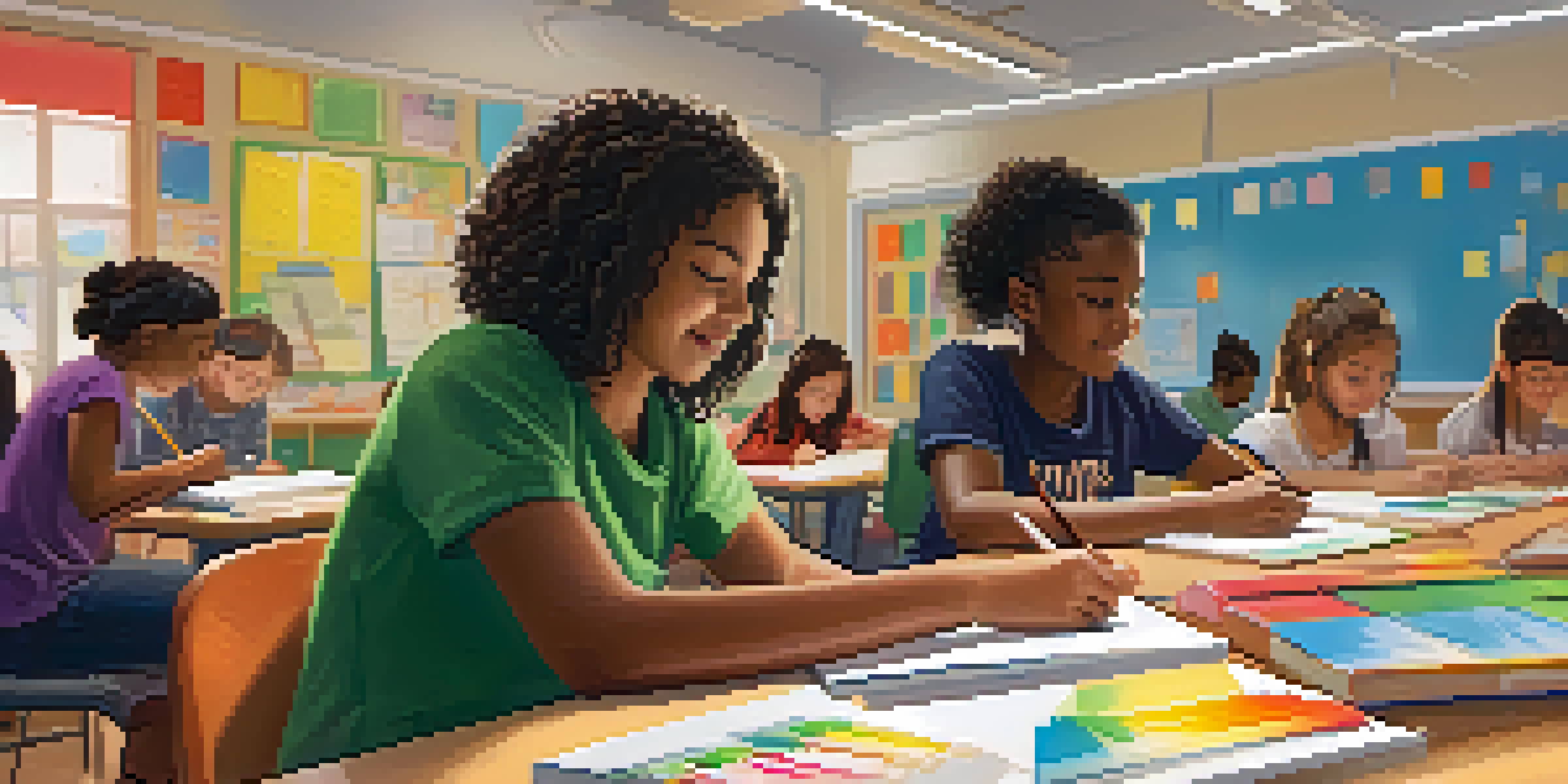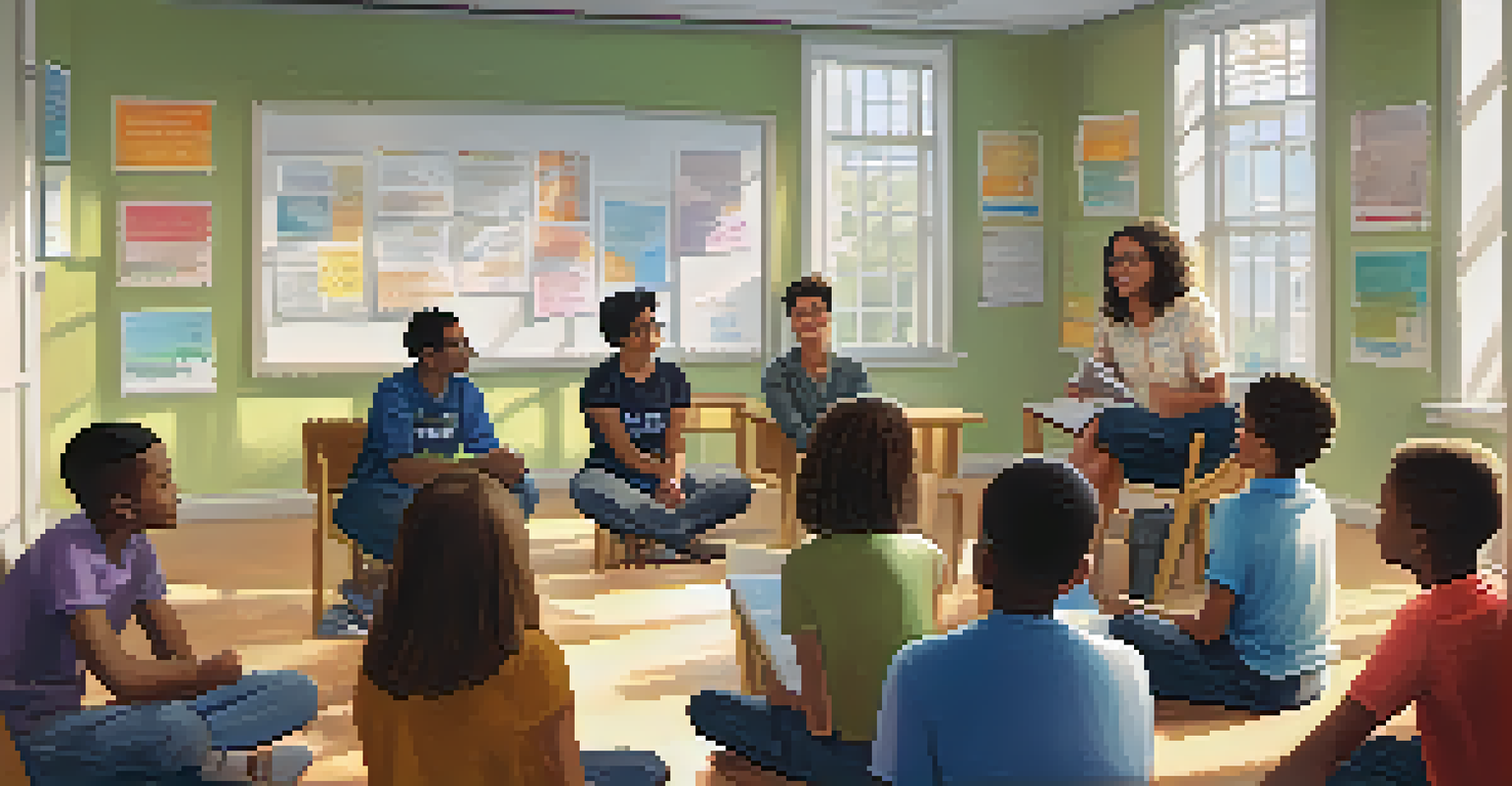Understanding Student Agency in Personalized Learning Approaches

Defining Student Agency and Its Importance in Learning
Student agency refers to the ability of students to take charge of their own learning processes. In essence, it empowers learners to make choices about what, how, and when they learn. This capacity not only boosts engagement but also fosters a sense of ownership over their education.
Education is not the filling of a pail, but the lighting of a fire.
When students feel they have control over their learning paths, they are more motivated and likely to persist through challenges. Imagine a garden where each plant is nurtured based on its unique needs; similarly, student agency allows each learner to flourish in their own way. This individualized approach is crucial, especially in a diverse classroom.
Moreover, student agency contributes to the development of critical thinking and problem-solving skills. When students actively participate in their learning, they learn to evaluate information, make decisions, and reflect on their progress, preparing them for real-world challenges.
How Personalized Learning Supports Student Agency
Personalized learning is an educational approach that tailors instruction to meet the unique needs of each student. This method aligns perfectly with student agency, as it allows learners to engage with material that resonates with their interests and learning styles. Think of personalized learning as a custom-fitted suit—designed to fit each individual perfectly.

In a personalized learning environment, students can set their own goals and choose resources that best suit their learning preferences. This flexibility not only enhances motivation but also encourages students to take responsibility for their learning journey, leading to deeper understanding and retention of knowledge.
Empowering Learners Through Agency
Student agency enables learners to take control of their educational journey, fostering motivation and ownership.
As technology continues to evolve, tools like learning management systems and adaptive learning platforms make it easier to implement personalized learning. These resources can analyze a student’s progress and suggest tailored activities, further promoting a sense of agency and engagement.
The Role of Educators in Fostering Student Agency
Educators play a pivotal role in nurturing student agency within personalized learning frameworks. By creating an environment that encourages exploration and choice, teachers can help students feel more empowered in their educational journeys. Think of an educator as a guide in a vast wilderness, helping students navigate their own paths.
The more that you read, the more things you will know. The more that you learn, the more places you'll go.
Effective teachers provide support and resources while allowing students the freedom to make decisions about their learning. This balance is critical; too much control can stifle student agency, while too little can lead to confusion. Encouraging self-directed learning through structured guidance is essential.
Additionally, professional development can equip educators with strategies to promote student agency. Training sessions focused on personalized learning techniques can inspire teachers to innovate their approaches, ultimately benefiting their students and fostering a more dynamic classroom environment.
Challenges to Implementing Student Agency in Learning
While fostering student agency in personalized learning has its benefits, there are challenges that educators and institutions must navigate. One common hurdle is the traditional mindset surrounding education, which often emphasizes standardized testing and rigid curricula. This can make it difficult to shift towards a more flexible, student-centered approach.
Another challenge is ensuring that all students have equal access to resources that support personalized learning. Disparities in technology, materials, and teacher expertise can hinder some students from fully exercising their agency. It's crucial to identify and address these gaps to create an equitable learning environment.
Personalized Learning Enhances Engagement
By tailoring education to individual needs, personalized learning promotes deeper understanding and student responsibility.
Lastly, some students may struggle with self-direction, especially if they are not accustomed to having a say in their learning. Providing scaffolding and support can help these learners build confidence and develop the skills needed to thrive in a personalized learning setting.
Strategies for Promoting Student Agency in the Classroom
To effectively promote student agency, educators can implement several practical strategies. First, incorporating choice boards allows students to select the activities that resonate with them. This approach not only engages students but also nurtures their decision-making skills as they evaluate options based on their interests.
Another effective strategy is to encourage goal-setting and reflection. By having students set personal learning goals and regularly assess their progress, they become more invested in their learning journeys. This reflective practice helps students understand their strengths and areas for improvement, fostering a growth mindset.
Additionally, fostering a collaborative classroom environment can enhance student agency. Group projects and peer feedback encourage students to communicate and learn from one another, creating a supportive space where they can take risks and explore new ideas together.
Measuring the Impact of Student Agency on Learning Outcomes
Understanding the impact of student agency on learning outcomes is essential for educators and policymakers. Research suggests that when students have agency, they tend to demonstrate higher levels of engagement, motivation, and academic achievement. This correlation is akin to watering a plant; the more attention and care it receives, the more it thrives.
To measure this impact, educators can utilize various assessment methods, including surveys, portfolios, and performance tasks. These tools allow teachers to gather data on student progress and satisfaction, helping them evaluate the effectiveness of personalized learning approaches.
Educators as Facilitators of Growth
Teachers play a crucial role in fostering student agency by balancing guidance with opportunities for exploration and choice.
Furthermore, tracking long-term outcomes, such as college readiness and career success, can provide insights into the value of fostering student agency. By continuously assessing and refining their approaches, educators can ensure that they are meeting the needs of all learners and promoting a culture of agency.
Future Trends in Student Agency and Personalized Learning
As education continues to evolve, the role of student agency in personalized learning will likely become even more significant. Emerging technologies, such as artificial intelligence and virtual reality, offer exciting opportunities for tailoring educational experiences to individual needs. Imagine a classroom where each student can engage in immersive learning tailored to their preferences—this is the future of education.
Moreover, the growing emphasis on social-emotional learning (SEL) is likely to intersect with student agency. Educators are recognizing the importance of developing students' emotional intelligence and resilience, which can enhance their ability to take charge of their learning. This holistic approach supports not only academic success but also personal growth.

Ultimately, fostering student agency will remain a key focus for educators and institutions looking to create engaging and effective learning environments. By embracing innovative practices and staying attuned to the needs of learners, the future of personalized education looks bright.